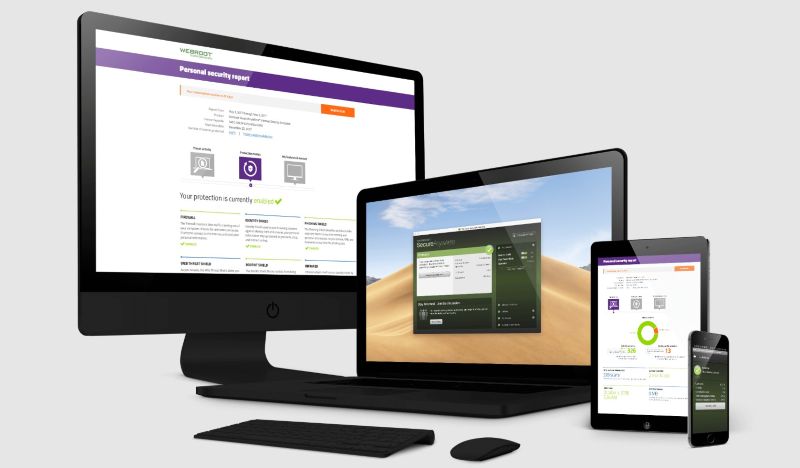TechRadar Verdict
This antivirus app is minuscule, speedy, efficient, and boasts a stack of appealing features. However, its accuracy might be a bit of a concern as there haven’t been many independent lab tests.
Pros
- +
Fast
- +
Exceptionally lightweight
- +
Includes password manager
- +
Tons of features
Cons
- -
Limited independent lab test results
- -
Some advanced features are tricky to use
Why you can trust TechRadar
Formerly known as Webroot SecureAnywhere, now simply Webroot, used to have AntiVirus Basic, Internet Security Plus, and Webroot Complete plans, which were replaced by Essentials, Premium, and Total Protection packages, each supporting different numbers of devices and features, as well as featuring family plans.
Despite the name change, at their core remains a curious little green-toned Windows and Mac app (which turns to angry red if it encounters a threat), as well as Android and iOS support, that takes an unconventional approach to malware hunting.
Specifically, other suites have a heavy focus on detecting known malware, typically requiring a bunch of background processes and regular downloads of signature definitions, whereas Webroot spends most of its time on smart behavior monitoring to allow it to detect the latest threats as soon as they emerge.
This allows it to be amazingly compact, with the 15MB on our test computer versus 1GB and more for many suites out there. And because it’s not checking every possible file for known threats the scans are completed in a matter of seconds.
Despite its small size, Webroot still manages a lengthy feature list, including antivirus, real-time anti-phishing, an extra anti-ransomware layer, a simple firewall, network monitor, system optimization, a password manager, unlimited cloud backup, and even a VPN with its top package.
Its identity protection feature includes a set of tools designed to prevent websites and malware from accessing your data. There’s protection from keyloggers, dubious browser add-ons, cookie and website data stealing, unauthorized screen grabbers, you name it, Webroot’s got it.
The interface reports statistics about recent scans and a button to launch an on-demand scan. A panel at the right-hand side provides access to the stack’s other security features and more.
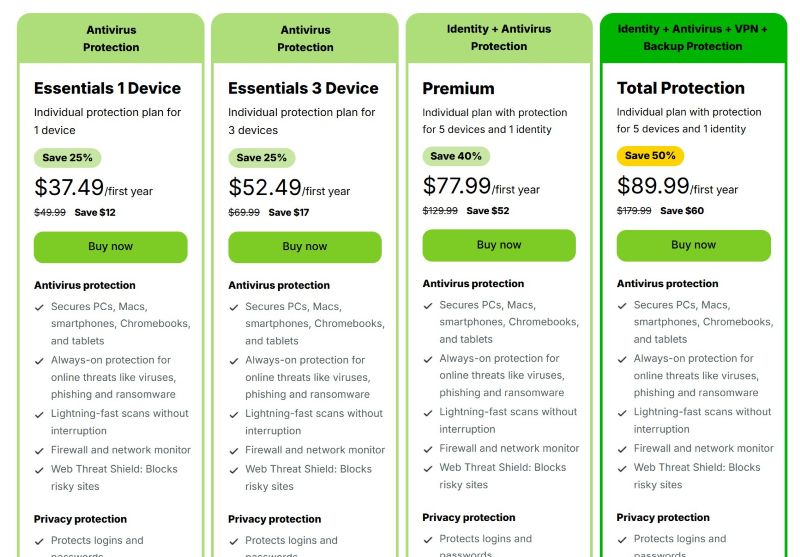
Plans and pricing
Webroot Essentials offers antivirus, anti-malware, browser protection, anti-phishing, and password manager, while covering one, three, five, or 10 PCs, Macs, smartphones, Chromebooks, or tablets at the same time, starting at $37.49 for the first year, renewing at $49.99 per year, for one device.
Next is Webroot Premium which includes everything from Essentials and throws in a system optimizer and identity protection. It can protect five devices and one identity for an individual account, or families with 10 devices and 10 identities. Plus, you’ll get up to $1 million in fraud expenses and stolen funds reimbursement. Its pricing begins at $77.99 for the opening year, renewing at $129.99.
Finally, Webroot Total Protection throws in everything that’s in Premium, while adding a secure VPN, parental controls, as well as automated cloud backup and restore with unlimited storage for one device. Its coverage is the same as that of Webroot Premium, and it’s priced at $89.99 in the first 12 months, renewing at $179.99.
There’s also a 14-day free trial that doesn’t involve you handing over your payment details, so there are no traps here.
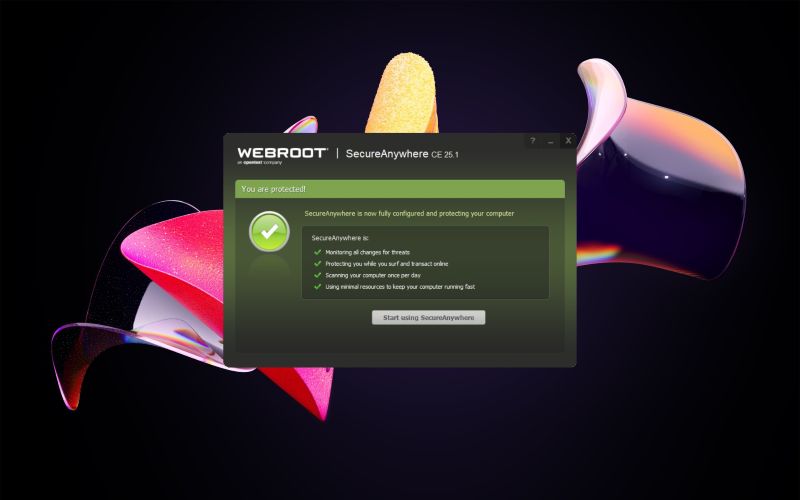
Setup
Installing Webroot is quite straightforward and speedy, which is no surprise considering that the package is so lightweight that there’s almost nothing to do. Webroot can run happily alongside most other antivirus apps as well, with none of the usual conflicts or hassles.
As part of getting started with Webroot, you’ll need to set up an online profile, password included. The platform demands a highly robust password and signing in requires that you successfully perform the traditional CAPTCHA testing.
After setup is complete, Webroot launches, runs an initial system scan, and begins actively monitoring your system. Now you can also run your own system scan, which took under a minute on our test PC but still managed to find a couple of items that other antivirus products typically ignore. The app allows you to review or deal with any findings in a click or two and proceed to leave Webroot protecting your device.
Whatever you’re doing, you won’t even notice Webroot doing its thing, as it doesn’t have any real impact on your system resources. In fact, it only added two background processes - one user application and one service, which usually consumed under 10MB of RAM, just about as undemanding as an antivirus can be.
You can also examine your protected devices from Webroot’s browser console and make sure their protective shields are active. Here you can also access your subscriptions and renew them if needed.
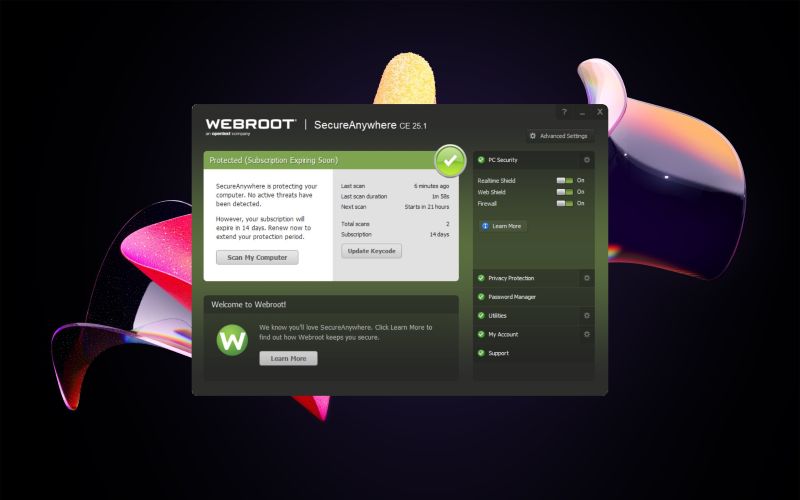
Antivirus
Webroot has a bit more cluttered interface than some of its competitors, featuring panels, icons, switches, tiny buttons, and plenty of text, but it is all neatly organized and decently straightforward, so it doesn’t impact user experience drastically.
The app starts protecting you immediately as it’s installed and the Scan My Computer button is pretty prominent, making it clear what you need to do from the get-go.
That said, locating other features can be a bit more tricky. For instance, there are multiple scan types, including Quick (RAM only), Full (local hard drives), Deep (searching for rootkits, Trojans, and more), and Custom (scanning specific files or folders), but you wouldn’t know it as they’re buried in the interface.
You’ll need to click on the little cog icon next to PC Security > Scan & Shields > Custom Scan to see what’s on offer.
Webroot will also add a right-click option to scan any file or folder in the Explorer (‘Scan with Webroot’) and you’ll be able to have the antivirus check them out even as another scan is already in progress.
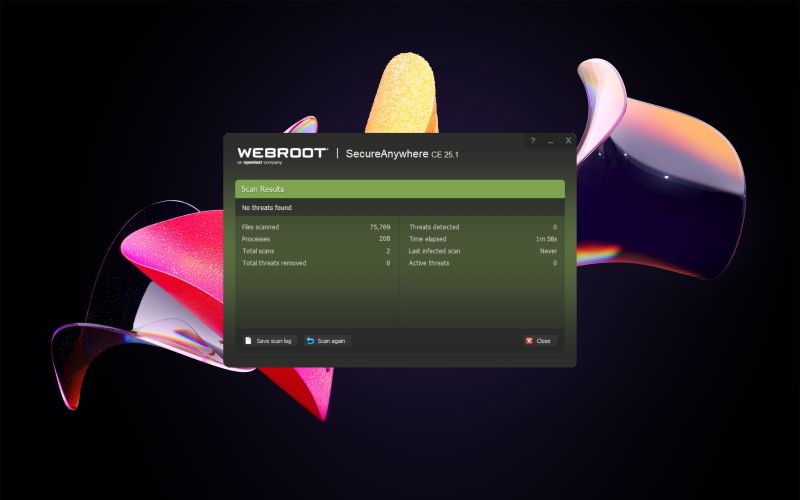
That said, whichever scan you choose, you can be sure it’ll be speedy in the extreme. The Quick Scan lives up to its name, completing in a matter of seconds. The intensive Deep Scan won’t take much of your time either - taking a little under three minutes, and the rest were somewhere in between.
Features
Webroot’s URL filtering comes in the form of the Web Threat Shield browser extension that the app installs automatically on your default browser (Chrome, Edge, or Firefox). It features browser annotations (showing the reputation of the site you’re visiting), search annotations (reputation of pages in your search results), and real-time protection from malicious sites, including those with phishing tools.
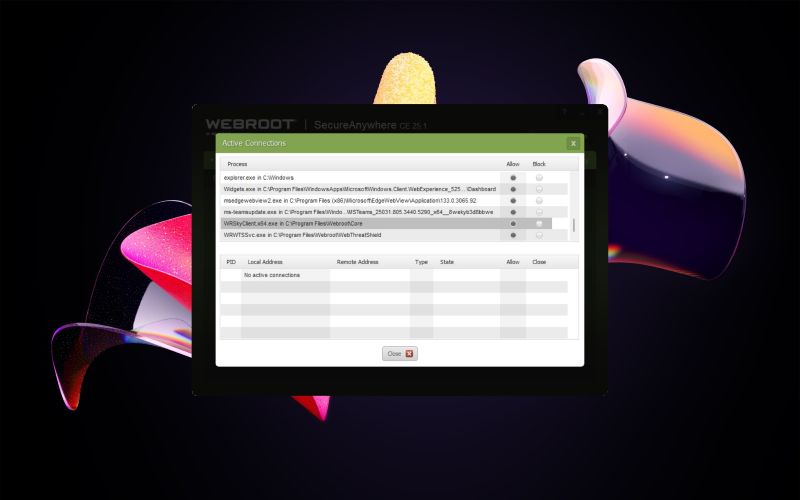
When it comes to the latter (phishing websites that try to trick you into revealing your login credentials so they can get access to your bank account, online shopping account, or social media profiles), Webroot also does a pretty good job with its Phishing Shield, which you can turn on and off in its Settings.
The program also offers what Webroot calls a firewall, but it doesn’t have much configurability we see with some of the competition. Instead, it does most of the heavy lifting by itself, looking out for new and untrusted processes connecting to the internet, alerting you about new connections made by untrusted applications, and asking you to approve or deny them.
Running apps are categorized into good, bad, and unknown and the firewall fortifies itself when Webroot identifies an active infection, asking for permission to run unknown programs while leaving regular activities like web browsing to continue uninterrupted. When there’s no current emergency, it doesn’t interfere with programs trying to access the network.
Experts won’t be impressed by the lack of control and it doesn’t put your system’s ports in stealth mode (leaving it up for the Windows Firewall to deal with, which it does), with all the apps present before installing Webroot considered trusted by default. However, otherwise, this is a welcome and unusual addition to any antivirus package.
All packages also feature a password manager courtesy of top-of-the-line LastPass, with all of its expected features, although its security track record hasn’t done it a service (we’re talking about the 2022 breach that is still wreaking havoc across the board).
Then there’s the SafeStart Sandbox that experts will appreciate and that we didn’t expect Webroot to have. Specifically, if you’re an avid antivirus researcher, you can use this feature to run dubious programs in an isolated environment under detailed customizable limitations, making it impossible for them to modify your system.
The Antimalware Tools dialog provides a utility to remove suspect programs manually, along with their associated Registry entries. While it’s not a full uninstaller, it could be handy and isn’t something we’ve seen from other vendors.
Here, you can also access convenient system repair features to fix the damage left behind after malware remediation, which includes an option to ‘Set system policies to defaults,’ fixing Task Manager, Regedit, or another imposed policy-type restriction with a click. You can also reboot the device into Safe Mode, deal with malware-modified desktop background, or reset your screensaver.
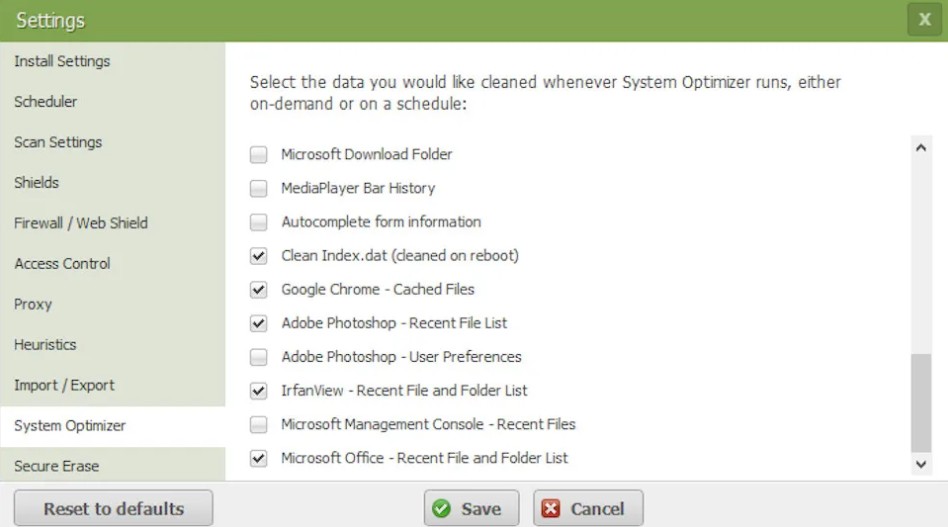
Upgrade to the Premium plan, and you’re getting a handy system optimizer tool in the Utilities section of the main window and in settings that let you select data to clean up whenever it runs, either on-demand or on a schedule. The scheduler may run on a daily or weekly basis, or at a regular interval, up to every 24 hours.
The Optimizer can also quickly wipe out useless files, freeing up the space previously occupied by them, but there’s no preview of what it plans to delete, nor do you get a report upon completion. However, you can see a blow-by-blow list of things it removed by going to the platform’s settings and System Optimizer and pressing the View Log button at the bottom right.
That said, don’t worry, it’s only temporary files and the Recycle Bin. More advanced users can configure the Optimizer to erase other types of data, like login history, storage folder for files burned to CD or DVD, and memory dump files.
On top of that, Premium also adds automatic deletion of your web activities, while Total Protection throws in an online backup service with unlimited secure storage for one PC or Mac (courtesy of Carbonite - OpenText owns both Webroot and Carbonite).
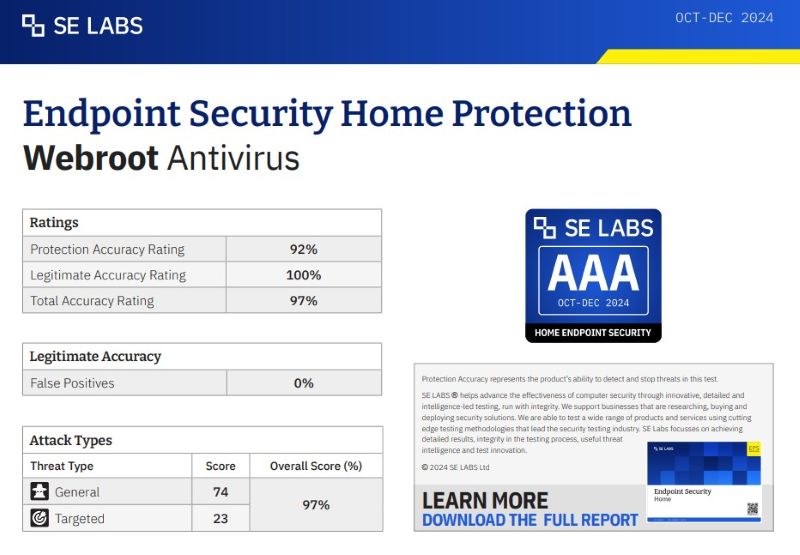
Protection
In terms of independent testing, neither AV-Comparatives nor AV-Tests have covered Webroot for years due to incompatibility, like Webroot’s prohibition of sending personal data to the internet and keeping a journal of reversible actions while awaiting a verdict from Webroot’s cloud analysis system.
We had more luck with SE Labs, which includes Webroot in its Home Protection tests.
Specifically, during the SE Labs’ Q4 2024 Home Protection test, Webroot rated eighth, with a Total Accuracy Rating of 97% and the top AAA award from SE Labs. However, it ranked lower than Avast Free Antivirus, Kaspersky Premium, McAfee Total Protection, Norton LifeLock Norton360, and Sophos Home Premium, which all scored 100%, as well as Panda Dome with 99% and Microsoft Defender at 98%.
Curious about what Webroot has been doing to protect your system while you weren’t looking? The Reports tab in its Settings allows you to check its current and historical activity. This is handy if technical support asks for available scan or threat logs. Also, if there’s a file you’re suspicious of, you can submit it to Webroot’s research team to have a closer look.
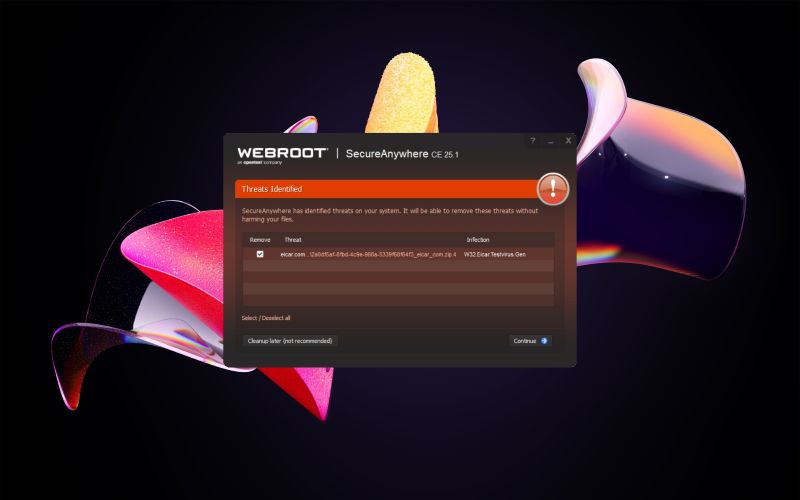
Anti-ransomware
Webroot also features handy built-in anti-ransomware capabilities and may even roll back the effects of encrypting ransomware in some cases (though not malware that encrypts or wipes the whole drive). That is, if it even manages to get past all the other layers of protection. That said, this comes with a disclaimer - the company itself warns that the success depends on available drive space.

Final verdict
Webroot is an exceptionally lightweight antivirus with accurate URL blocking and powerful bonus features, but test results show it may not be as accurate as the top players in the antivirus field. Still, it runs surprisingly easily alongside other antivirus products, perhaps allowing you to run it alongside Microsoft Defender, which would do a great job of keeping you safe.
We've also highlighted the best antivirus
Sead is a seasoned freelance journalist based in Sarajevo, Bosnia and Herzegovina. He writes about IT (cloud, IoT, 5G, VPN) and cybersecurity (ransomware, data breaches, laws and regulations). In his career, spanning more than a decade, he’s written for numerous media outlets, including Al Jazeera Balkans. He’s also held several modules on content writing for Represent Communications.
You must confirm your public display name before commenting
Please logout and then login again, you will then be prompted to enter your display name.
